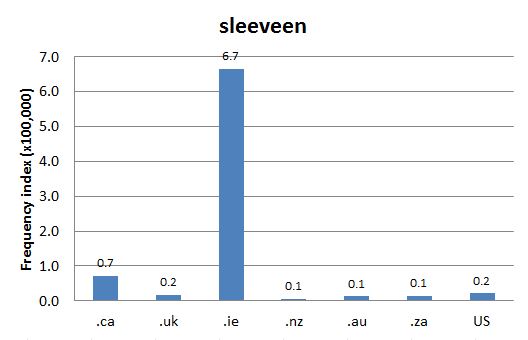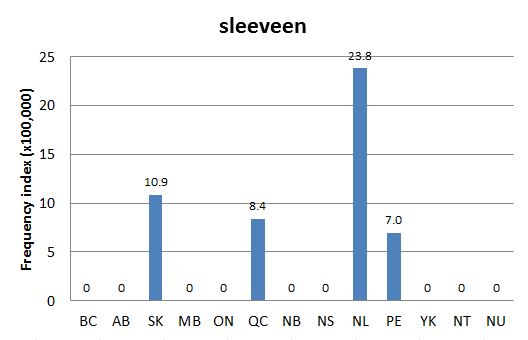DCHP-2
sleeveen sleveen, slieveen, sleiveen, < Irish Gaelic slighbín 'trickster' DCHP-2 (May 2016)
n. — Newfoundland, slang, informal
a sly, mischievous person; a rascal.
Type: 2. Preservation — In Canada, sleeveen appears most often in Newfoundland and Labrador English (see Chart 2). Deriving from the Irish Gaelic "slighbín", which Dinneen (1927: 1055) defines as 'a sly-mannered person, a schemer, a trickster', the term made its way to Newfoundland with Irish immigrants in the 18th and 19th centuries. The term is still in widespread use in Ireland, as reflected in Chart 1, with Canadian usage following second and ahead of the US. Sleeveen may describe not only a person bearing ill intentions but also a mischievous child (see NL Tourism reference). The 1847 quotation marks the earliest Canadian attestation, though in an Irish context. The first clearly Newfoundland attestation is the 1881 quotation. Since Newfoundland joined Confederation in March 1949, the first Canadian attestation is the 1949 quotation. OED-3 lists an 1843 quotation from Ireland as the earliest overall.
See also COD-2, s.v. "sleeveen", which is marked "Cdn (Nfld) & Irish derogatory", DNE, s.v. "sleeveen", and OED-3, s.v. "sleeveen", which is marked "Irish and Newfoundland".References:
- COD-2
- DNE
- Dinneen (1927)
- NL Tourism "Sleeveen - Newfoundland and Labrador Language Lessons" Accessed 26 Jun. 2014
- OED-3 s.v. "sleeveen" Accessed 26 Jun. 2014
Images:
Chart 1: Internet Domain Search, 25 Jun. 2014
Chart 2: Internet Domain Search, 25 Jun. 2014

